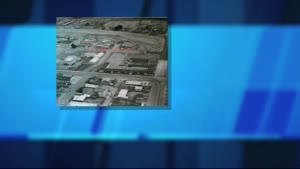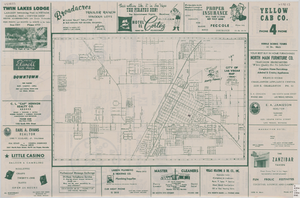Search the Special Collections and Archives Portal
Search Results

Jack K. Leavitt interview, February 28, 1979: transcript
Date
Archival Collection
Description
On February 28, 1979, collector Alick Dziabczenko interviewed Jack Leavitt in Las Vegas, Nevada. In this interview Mr. Leavitt talks about his childhood in Las Vegas. He also talks about his family life and his career in the city, as well as some of the many changes he has seen in Las Vegas.
Text

Jean Sherman McColl interview, March 1, 1977: transcript
Date
Description
On March 1, 1977, collector Sam C. Melchiome Jr. interviewed Jean McColl (born May 24th, 1931 in California) at her home in Las Vegas, Nevada. In this interview, Jean McColl discusses growing up in Searchlight and then Las Vegas, Nevada. She discusses how her family came here as well as the many changes she has seen through the decades living in Las Vegas, Nevada.
Text

Las Vegas African American Community Conversations, Part 4: Early African American Legal Community: video
Date
Archival Collection
Description
The Las Vegas African American Community Conversations is a four part, one hour round table conversation with local Las Vegans. They share their powerful stories and great history, with topics ranging from “Migration, Civil Rights, Education, Church, Entertainment and the Early Legal Community”. Part Four: A conversation about “ Early African American Legal Community” MODERATOR- Rachel Anderson (Professor-UNLV Boyd School of Law) PANELISTS- Michael L. Douglas (Justice-Supreme Court of Nevada) Karen Bennett (Justice- Las Vegas Justice Court) Booker Evans (Greenberg Traurig, LLP) John R. Bailey ( Attorney/Managing Partner Bailey Kennedy) Timothy C. Williams (Justice-District Court)
Moving Image
Audio clip from interview with Doug Unger, August 26, 2014
Date
Archival Collection
Description
Part of an interview with Doug Unger on August 26, 2014. In this interview, Unger discusses how he acquired Supreme Mattress, a local mattress company that supplied mattresses to Strip casinos.
Sound

Transcript of interview with Jimmy Gay by Perry Kaufman, April 12, 1972
Date
Archival Collection
Description
Interview with James A. Gay III conducted by Perry Kaufman on April 12, 1972. Arriving in 1946 from Fordyce, Arkansas, Gay became the first African-American mortician in Las Vegas. He later worked as Assistant Manager of the Sands Hotel and Casino and Union Plaza while serving as an executive board member of the Culinary Union. Instrumental in the Las Vegas community, Gay worked to improved race relations, addressing social, economic, and civic issues. Gay was awarded an honorary degree from the University of Nevada, Las Vegas in 1988.
Text

Transcript of interview with Leandrew Winston by Claytee D. White, August 03, 2016
Date
Archival Collection
Description
Leandrew Winston is best known for his work in public broadcasting. He was born in Grady, Arkansas where he lived on a farm with his family. He migrated first to California and then to Las Vegas. Once in the city, Winston became a well-connected figure in the African American community and often tells stories about his experiences with police brutality. He chose to work in public broadcasting and in 1971 became the first African American to work at PBS at Channel 10. He started hosting Ten on the Black Side, his own television news talk show, in 1975 and later became the Minority Affairs Director at Channel 10. In 1984, Winston created a documentary for PBS called The Road to Las Vegas, a Black Perspective. He returned to school in 1987 and received his MBA from National University. Upon returning to Las Vegas, he helped found KNPR. Winston left Channel 10 and took a job with KCEP in 2001.
Text

Transcript of interview with Alice Key by Claytee D. White, February 17, 1997
Date
Archival Collection
Description
Interview with Alice Key conducted by Claytee D. White on February 17, 1997. Dancer, writer, and community activist, Key served as Deputy Labor Commissioner for the State of Nevada and leader of the NAACP in Las Vegas. As a newspaper reporter, she exposed the separation of blood plasma according to race in World War II. With Bob Bailey, Key created the first all-black television show in the nation and a radio program, interviewing black entertainers in a talk-show format.
Text

Street map of the city of Las Vegas, 1954
Date
Description
Image

Transcript of interview with Hazel Gay by Claytee D. White, December 2, 1995
Date
Archival Collection
Description
Interview with Hazel Gay conducted by Claytee D. White on December 2, 1995. Hazel and her husband Jimmy Gay moved to Las Vegas in 1946, becoming leaders in the African American community during the civil rights era.
Text

